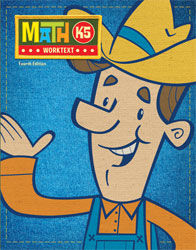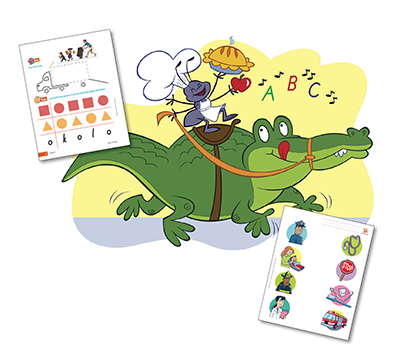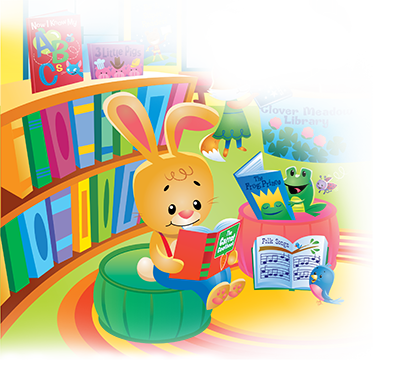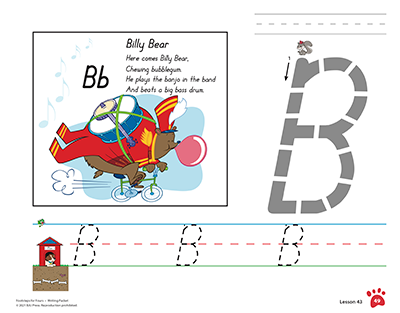BJU Press’s early childhood program develops foundational knowledge and skills in Bible, math, social studies, science, handwriting, and language arts for future grades. This program, flexible for all types of learners at all stages of learning, develops the joy of learning through both teacher-guided and independent discovery-based activities. Daily themed lessons with characters teach foundational skills that are supported with music and engaging visuals. Free play at intentional learning centers encourages natural curiosity, while group activities encourage social-emotional development. Biblical worldview themes point students to a knowledge of God and His will.
Program Approach for Early Childhood
The BJU Press early learning program sets children on a path for future learning success by developing their foundational knowledge and skills and by helping them to take joy in learning. Students engage in intentional learning with free play, hands-on learning, and independent discovery-based and teacher-guided activities. Themes, visuals, and learning centers encourage the students’ natural curiosity, and group learning opportunities help students with their social-emotional development. As they play and learn together, following their teachers directions, students learn how to relate to others. Every day in our early learning program is a day for students to explore their world. Lessons and learning strands prepare them for future learning in math, social studies, and science. Bible strands and dedicated K4 and K5 Bible courses help students to both live and know the Bible. We strive to equip teachers with games and strategies to turn what children do naturally into intentional play and to make early learning a joyful and engaging experience.
Teaching Foundational Phonics
Ultimately, phonics is about preparing students to read. But we are not just preparing them to be able to read. We are preparing them to read with confidence and understanding, because students who are confident in their ability to read are better prepared to value and enjoy reading. Building reading confidence in early learners is a gradual process—they must be ready to read, and they must be conscious of how letters make words. As they build phonemic awareness, they can learn to recognize known words, and then use what they know about letters to decode words they don’t know. A well-prepared student will be able to make meaning out of the written word, to read with fluency, to communicate effectively, and to enjoy lifelong reading.
In order to prepare them appropriately, the BJU Press early learning program starts with strong phonics foundations. To cultivate reading readiness and spelling consciousness, learning games and songs develop and encourage phonemic awareness throughout each course. Theme characters and group learning segments like the Big Red Barn in K3 and the Teaching Tree in K4 help children to focus and learn new letters visually. In K5, phonics stories, phonics songs, rhyming songs, read-alouds, and multisensory activities gradually develop letter-sound associations. Once students can recognize letters, they are ready to learn to decode words. Our phonics program uses a word-family approach and high frequency words to quickly build vocabulary so that students can begin practicing reading comprehension in early readers. Our phonics characters help students to recognize visual and textual cues so students can develop their word-recognition skills. These characters give students an easy and memorable way to learn how to read words with short and long vowels, consonant blends, digraphs, r-influenced vowels, special vowel sounds, silent consonants, suffixes, and other phonetic patterns. Phonics instruction continues through Grade 3, with additional review options through Grades 4 and 5.
Applying Foundational Skills
Children must also begin developing the skills necessary for them to be successful learners. In the BJU Press early learning program, they will start building worldview foundations early by learning Bible Action Truths and Bible promises—truths about the Bible and living for Christ that are closely tied to specific memory verses for retention and application. Students will continue building these foundations in dedicated K4 and K5 Bible courses.
Students will be introduced to early math skills that help them recognize numbers and shapes, as well as help them count, sort, find patterns and sequences, and classify. From K3 to K5, students will develop strong foundations for number sense with a manipulative-based approach. Teachers can use the manipulatives as modeling tools while students get a hands-on understanding of number manipulation. Using manipulatives in this way helps students to develop problem-solving skills, mathematical reasoning, and computational fluency. In the full year K5 math course, students get their first look at how math applies to real-life situations as they develop an understanding of math and God’s purpose for it.
Students will also develop early foundations in science and social studies skills. Suggestions for science and sensory centers and lessons give teachers opportunities to show children how to observe and interact with their world, and they develop social and heritage studies skills by learning about how communities work and what people do in their communities. Suggested games, activities, and crafts also build fine and gross motor skills, and tracing activities develop pencil grip and posture.
Communicating Through Listening, Speaking & Composing
All of language arts studies should lead students to be purposeful and godly communicators. Early opportunities to practice listening, speaking, and composing play a role in social-emotional development and help students see the purpose of communication. In the BJU Press early learning materials, students will regularly spend time listening and responding to character stories, phonics stories, songs, and more. Discussion times not only build vocabulary and help shape worldview, but they also give students practice in telling stories and relating emotions verbally. Teacher-guided and group composition activities help students develop clear communication skills as they learn how to share personal stories and opinions through the written word.
Relating Biblically to Peers, Authorities & Other People
Preschool classrooms give children important opportunities to learn—not just how to be students in a classroom but also how to get along with people and to do so in a God-honoring way. Biblical worldview shaping themes in each BJU Press preschool course and specific Bible lessons encourage children to see that they learn in order to better serve others. Lessons and stories give teachers opportunities to instill healthy habits in early learners. Social studies themes develop cultural knowledge so that students can understand the different types of people they will meet and how they can serve them. Suggested group activities and learning centers help children learn how to work and play together under teacher guidance and observation.
Opportunities for Active Learning
Early learning is all about giving children ways to experience their world that prepare them for deeper experiences in the future. We fill our early learning programs with ways for students to engage with and discover more about their world and how they fit into it. Our early learning program is full of manipulatives and activities for hands-on learning. Students will be able to prepare snacks, use letter cards to build words, and use shapes and number lines for shape mastery and number sense, and much more. Arts and crafts segments, motor skills activities, and learning centers all give students opportunities to discover more about their world through intentional play.
Applying the Knowledge of God
Even at an early age, children are able to apply what they understand about God and the Bible to their lives. Using the teaching guides, teachers can highlight healthy habits for children so that they can learn to respect others and demonstrate a strong work ethic. Our early learning program expands what students understand about God and helps them apply it as they learn. Teachers can use the Bible Action Truths and biblical worldview themes in each program to direct how their students think, how they approach learning, and how they play. The foundational truths and catechisms redirect how students think about themselves and their world as they learn that God is great and God is good, that God created them and all things, and that the Bible is God’s Word and it is true. As students learn, they can more fully appreciate the wonder of God’s creation and give Him glory for it. By learning, children can serve God and others more effectively.
Vision
To develop foundational knowledge and skills through guided activities and independent exploration that encourage a joy of learning while teaching students to relate biblically to their authorities and peers.
Goals
- To teach students foundational phonics to prepare for reading with understanding
- To guide students in applying foundational Bible, math, science, and social studies skills
- To give opportunities to communicate through listening, speaking, and composing
- To guide students in relating biblically to their fellow students, authorities, and other people in their communities
- To provide opportunities for hands-on learning, discovery learning, and intentional play
- To equip students in applying the knowledge of God to how they think, learn, and play
Scope & Sequence

Pathways for Preschool
Circle Time: In the Big Red Barn
Large-group activity; Language and vocabulary skills
Prereading: A-B-C Time
Print awareness; Letter recognition; Auditory discrimination
Prereading: Colors Are Fun!
Color recognition
Prereading: Rhyme Time
Language expression; Auditory discrimination; Dramatizations
Listening and Literature: Once Upon a Time
Tales in the Barnyard stories; Read-aloud suggestions; Listening skills and visual memory
Premath: 1, 2, 3, Go!
Counting and number recognition; Sorting and sequencing
Premath: Look Up, Look Down
Opposites and positional words
Premath: Show Me a Shape
Shape recognition; Large motor-skill development; Following directions; Creative movement
Environment: Let’s Discover!
Science and observation skills; Hands-on learning
Arts: Let’s Create!
Creative expression; Hand-eye coordination
Music: Sing with Me
Singing and listening; Moving and playing
Motor: A Hop, Skip, and a Jump
Social interaction
Social: Happy Habits
Manners, habits, and social training
Cooking: Yummy in My Tummy
Cooking and following directions; Sensory and language experiences

Footsteps for Fours
Prereading
Language acquisition and development; Recognition of alphabet letters; Phonemic awareness of alphabet sounds /a/ to /z/; Letter-sound recognition of medial short-vowel sounds; initial and final consonants; Optional beginning reading strand for eager learners
Listening and Literature
Traditional literature; realistic and fanciful prose and poetry; nursery rhymes; Vocabulary development and enrichment; Auditory memory; sound by direction, pitch, tempo, and volume; rhyming words; Listening questions to develop comprehension; Dictation of group writing experiences; sentence completions; story sequencing
Handwriting
Correct posture, pencil hold, and paper placement; Prewriting skills; finger tracing and pencil tracking of left-to-right, vertical, horizontal, diagonal, zig-zag, and curved lines; Uppercase and lowercase PreCursive alphabet; numbers 0–12
Mathematics
Number recognition 0–20; counting to 100; shape recognition; pattern sequencing; color sequencing; Calendar, clock, coins, measurement, dot patterns, number sets, number line, ordinals, fractions; Position words
Social Studies
Concepts of God’s plan for the child and his family; Patriotism, patriotic symbols, holidays; Community helpers, transportation
Science
Environment: seasonal changes of plants and animals; animal families and animal homes; Hands-on: experiments, cooking, weather, space, and magnets
Art
Art suggestions and craft activities correlated with unit themes
Motor
Fine and gross motor development activities; games, action rhymes, and action songs
Music
Songs, rhymes, and musical games; Additional music strand to complement lessons through movement, rhythm instruments, retelling of stories, games, and songs

Focus on Fives
Language Arts
Prereading
Print awareness: left-to-right eye progression; visual discrimination; visual memory; Reasoning; classifying; sequencing size and shape relationships; Rhyming; awareness of author; picture reading; Listening comprehension; Comparing; Following directions; perceiving concepts, such as up/down, hard/soft; Alphabet recognition: phonemic awareness
Phonics and Word Perception
Units 1–3: Letter-sound association—consonants and short vowels; words with closed syllable phonograms (examples: _it, _at); plural words with s and es; compound words; possessive words; Units 4–6: Letter-sound association—consonant blends and digraphs, long vowels; r-influenced vowels; special vowel combinations; vowel patterns for long vowels (examples: _oke, _o, _oat)
Early Reading Skills
Comprehension; Predicting outcomes; answering questions after silent reading; sequencing events; developing vocabulary; Perceiving relationships; distinguishing reality from fantasy; Matching words and pictures; matching sentences and pictures; reading short stories; Oral communication and oral reading; Discussion; action rhymes; pantomime; retelling stories; reading phonics stories orally
Composition
Dictating sentence ideas for individual composition; completing sentence starters
Handwriting
Letter formation; principles of slant; alignment; spacing; pencil hold; posture
Related Arts
Art
Drawing; painting; making crafts to match the unit themes of the lessons (examples: puppets, papier-mâché pig)
Motor Skills
Encouraging fine-motor skills through prewriting activities, fingerplays, cooking and Learning Center activities, and student activity worksheets; Developing gross-motor skills during simple games and group activities
Music
Traditional and piggyback songs; music games
Heritage Studies
Geography: US landmarks; history: Native Americans, colonial life; culture: families, community helpers, Hispanic culture, Bible times, farming, American celebrations
Science
Appreciating God’s creation; Learning about birds, bugs, magnets, seasons, water, human bodies, weather, rocks, oceans, sun, moon, plants, and animals; Experiencing hands-on activities
Reading
Word Recognition
Application of phonics concepts presented in K5 phonics lessons; Readers 1–16—short vowels, single consonants; Readers 17–34—short vowels, consonant blends and digraphs, long vowels, r-influenced vowels, special vowels; Word families; high-frequency words; compound words; words with suffixes
Comprehension
Picture reading; Questioning to develop higher-order thinking skills; Predict text; make inferences; draw conclusions; predict outcomes; Compare; sequence events; follow directions
Vocabulary
Meaning from context
Literature
Read a variety of genres: family stories, informational articles, fanciful animal stories, poetry, Bible accounts, and realistic fiction; Distinguish reality from fantasy
Silent Reading
Reading for specific information; reading for author’s message
Oral Reading
Communicate message of the author; communicate in a natural manner; Portray a character; Respond to punctuation: period, exclamation point, question mark, quotation marks





